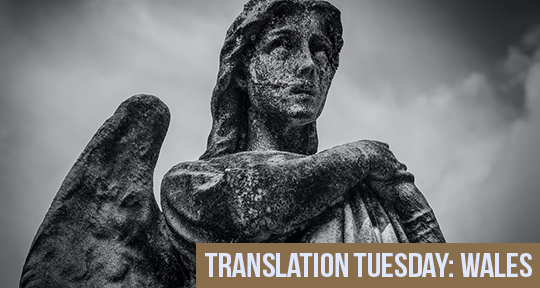Today’s Translation Tuesday features a cracking piece of Welsh fiction from Sian Northey where a bored angel descends to earth and finds himself having to play to a human crowd. In Susan Walton’s translation, nuances in speech and register are captured to delightful effect, allowing the voices of angels and men to truly soar. Let yourself be enthralled by this wholly original tale of shape-shifting and light-hearted rebellion.
They didn’t twig what I was. A bit of a disappointment, really, because I’d gone for a classic look—full-length white nightie, two wings, and a light dusting of radiance, but not too blingy. You don’t want to be trashy, do you? That’s why I told that Jelia and his bloody trumpet to stay at home.
“You can’t go by yourself,” he’d said, after snatching up a dusty volume from the piles at his side, opening it and starting to read. “A host—that means a multitude.”
“Nope. Never. No way, José. Not a chance in hell, gwd boi.” Jelia had looked at me suspiciously, raising one eyebrow, waiting for an explanation. “Practice. They must be communicated with. It’ll need to be done again at some point, for sure,” I’d said. “And anyway, I’m bored,” I’d added. “But you’re staying at home. Bad enough that one of us is breaking the rules.”
“Go then,” Jelia had said, turning back to his trumpet. “Anyroad, the place has changed a lot, they say. They won’t be very impressed with you.”
And they weren’t. I chose a spot where there were quite a few people and appeared as it was getting dark. I stood there for a few minutes before anyone said anything. I rather regretted not letting Jelia come with me—him and his twenty trumpets. I’d expected the people to be surprised, even fearful, but the only thing that happened was that a couple of them passed me to reach a long counter where drinks were being served. I noticed that one of the girls went through me, rather than pushing against me; she turned to look at me. READ MORE…




